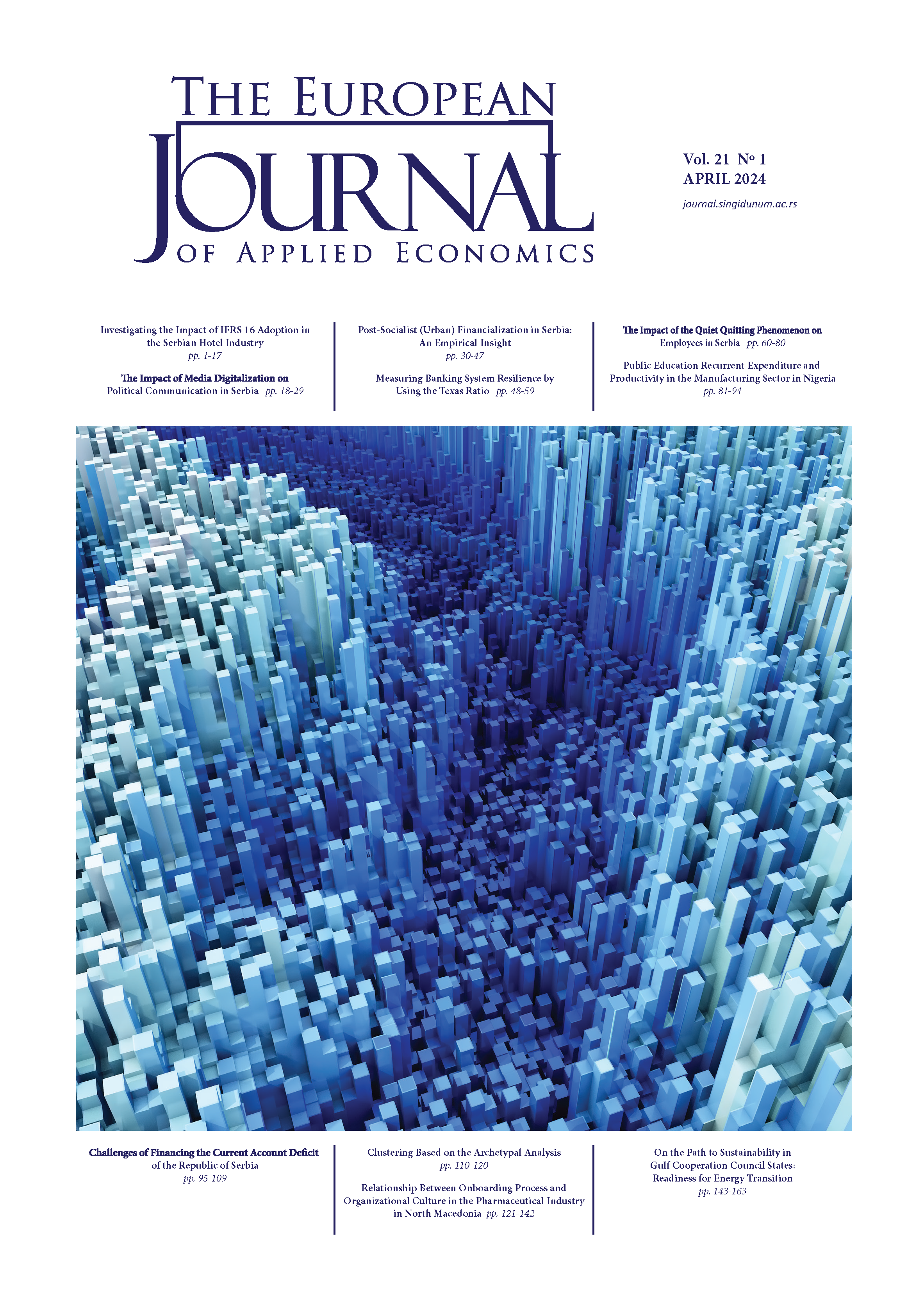THE IMPACT OF MEDIA DIGITALIZATION ON POLITICAL COMMUNICATION IN SERBIA
Abstract
Politics-related communication is exceptionally significant as the messages sent to the electorate have a decisive influence on the formation of their stances on political matters and figures, electoral participation, and, thus, elections outcome. The present study aims to provide insight into contemporary digital political communication in Serbia by exploring voter preferences regarding obtaining political information through television and print media as well as official websites and social networks owned by broadcasters. The majority of existing academic papers belonging to the field of digital political communication emphasise the importance of digital technologies for shaping voters' attitudes and structuring political campaigns, assuming, as a fact, the willingness of citizens to obtain information primarily through the digital sphere. We have recognised the importance of investigating the significantly under-researched process of shifting citizens' attention from traditional to digital media. Thus, we set up a research hypothesis stating that contemporary political communication should be executed mainly digitally. Our hypothesis was evaluated by means of an exploratory study based on a series of questions related to respondents' habits regarding political information acquisition through all relevant traditional or digital media operating in Serbia. The raw data were coded to be imported to SPSS and quantitatively analysed using descriptive statistic measures, i.e., minimum, maximum, mean, standard error and standard deviation. The subsequent qualitative analysis convinced the authors that the hypothesis should be accepted since the respondents undoubtedly prefer to obtain political knowledge via the Internet, although still inclined to be informed through traditional media as well.
References
Altay, S., Berriche, M., & Acerbi, A. (2023). Misinformation on Misinformation: Conceptual and Methodological Challenges. Social Media + Society, 9(1), 1-13. doi:https://doi.org/10.1177/20563051221150412
Antypas, D., Preece, A., & Camacho-Collados, J. (2023). Negativity spreads faster: A large-scale multilingual twitter analysis on the role of sentiment in political communication. Online Social Networks and Media, 33, 1-15. doi:https://doi.org/10.1016/j.osnem.2023.100242
Bartosz, K. (2022). Information Overload: The Real Problem or a Temporary Phenomenon of Modern Cultures? Kommunikation Medien(14), 1-10. doi:https://doi.org/10.25598/JKM/2022-14.37
Bennett, L., & Pfetsch, B. (2018). Rethinking Political Communication in a Time of Disrupted Public Spheres. Journal of Communication, 68(2), 243–253. doi:https://dx.doi.org/10.1093/joc/jqx017
Bhat, A. H. (2019). Social Media and Political Conflict. International Research Journal of Management Sociology & Humanity, 10(10), 282-291. doi:https://doi.org/10.32804/IRJMSH
Boulianne, S., Oser, J., & Hoffmann, C. P. (2023). Powerless in the digital age? A systematic review and meta-analysis of political efficacy and digital media use. New Media & Society, 25(9), 2512-2536. doi:https://doi.org/10.1177/14614448231176519
Cohen, J., Tsfati, Y., & Sheafer, T. (2008). The Influence of Presumed Media Influence in Politics; Do Politicians’ Perceptions of Media Power Matter? Public Opinion Quarterly, 72(2), 331-344. doi:https://doi.org/10.1093/poq/nfn014
Flanagin, A., & Metzger, M. J. (2014). Digital Media and Perceptions of Source Credibility in Political Communication. In K. Kenski, & K. Hall Jamieson (Eds.), The Oxford Handbook of Political Communication (pp. 417-436). Oxford: Oxford Academic. doi:http://dx.doi.org/10.1093/oxfordhb/9780199793471.013.65
Gainous, J., Abbott, J. P., & Wagner, K. M. (2019). Traditional Versus Internet Media in a Restricted Information Environment: How Trust in the Medium Matters. Political Behavior, 41(2), 401-422. doi:https://doi.org/10.1007/s11109-018-9456-6
Gómez-García, S., Zamora, R., & Berrocal, S. (2023). New Frontiers for Political Communication in Times of Spectacularization. Media and Communication, 11(2), 109-112. doi:https://doi.org/10.17645/mac.v11i2.7069
Jevtović, Z., & Cebalović, M. (2018). Političko komuniciranјe i nove strategije PR-a na društvenim mrežama u Srbiji. Politička revija, 56(2), 5-23. doi:https://doi.org/10.22182/pr.5622018.1
Karlsen, R., & Aalberg, T. (2023). Social Media and Trust in News: An Experimental Study of the Effect of Facebook on News Story Credibility. Digital Journalism, 11(1), 144-160. doi:https://doi.org/10.1080/21670811.2021.1945938
Koc-Michalska, K., Klinger, U., Bennett, L., & Römmele, A. (2023). (Digital) Campaigning in Dissonant Public Spheres. Political Communication, 40(3), 255-262. doi:https://doi.org/10.1080/10584609.2023.2173872
Kruse, L. M., Norris, D. R., & Flinchum, J. R. (2017). Social Media as a Public Sphere? Politics on Social Media. The Sociological Quarterly, 59(1), 62-84. doi:https://dx.doi.org/10.1080/00380253.2017.1383143
Oparaugo, B. (2021). Media and Politics: Political Communication in the Digital Age. International Journal of Multidisciplinary Research and Explorer, 1(2), 14-23. doi:https://doi-ds.org/doilink/02.2021-85426151/IJMRE
Pilik, M., & Ahmadov, Z. (2020). The Evolution of the Internet and the Advantages of Online Marketing in This Context. Audit Journal, 28(2), 86-94. Retrieved 1 31, 2024, from https://audit-journal.az/files/articles/57.pdf
Radović, V., & Dojčinović, M. (2022). Web Media as an Alternative Sphere of Information in Post-journalism. 465-481. Univerzitet u Nišu, Filozofski fakultet, departman za komunikologiju i novinarstvo. doi:https://doi.org/10.46630/jkaj.2022.28
Roa Robles, L. M. (2019). Redes sociales y jóvenes universitarios: influencia de la red social Facebook en el comportamiento electoral de universitarios en las elecciones presidenciales 2018. Bogota: Pontificia Universidad Javeriana, Facultad de Ciencia Política y Relaciones Internacionales.
Ruess, C., Hoffmann, C. P., Boulianne, S., & Heger, K. (2023). Online political participation: the evolution of a concept. Information, Communication & Society, 26(8), 1495-1512. doi:https://doi.org/10.1080/1369118X.2021.2013919
Salh, A. (2017). Impact of Mass Media on Politics. Media Dialogues, 10(26), 195-199. Retrieved 1 31, 2024, from https://medijskidijalozi.files.wordpress.com/2017/02/md-26-za-c5a1tampu.pdf
Schäfer, A. (2023). Digital heuristics: How parties strategize political communication in hybrid media environments. New Media & Society, 25(3), 522-539. doi:https://doi.org/10.1177/14614448211012101
Strömberg, D. (2015). Media and Politics. The Annual Review of Economics, 7, 173-205. doi:https://doi.org/10.1146/annurev-economics-080213-041101
Velički, D., Dumančić, M., & Topolovčan, T. (2017). The Net Generation, the Internet, and Political Communication and Participation. Croatian Journal of Education, 19(1), 237-266. doi:https://doi.org/10.15516/cje.v19i1.2245
Vidić, K., Rakar, M., & Đajić, M. (2011). Politička komunikacija na internetu. Belgrade: Centar modernih veština.
Weeks, B. E., & Gil de Zúñiga, H. (2019). What’s Next? Six Observations for the Future of Political Misinformation Research. American Behavioral Scientist, 65(2), 1-13. doi:https://doi.org/10.1177/0002764219878236


